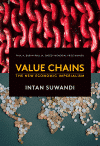
This is our legacy
is the author of many books of poetry, most recently Made in Detroit. | more…

Marge Piercy is the author of many books of poetry, most recently Made in Detroit. | more…

New issue of Monthly Review! If there is one thing that is clear about the economic situation in the mature capitalist economies, as we write these notes in mid-August 2019, it is that the financial world is increasingly running scared and looking for safe havens, worrying about the storm clouds ahead. There is now little doubt that the world economy is on the verge of a recession after a long sluggish recovery from the Great Financial Crisis of 2007-09. In itself this should not give occasion to surprise. In this instance, however, there lurks a bigger fear, the possibility of a financial Armageddon on the level of the Great Financial Crisis of 2008—or worse. | more…

Winner of the 2018 Paul M. Sweezy – Paul A. Baran Memorial Award for original work regarding the political economy of imperialism, Intan Suwandi’s Value Chains examines the exploitation of labor in the Global South. Focusing on the issue of labor within global value chains—vast networks of people, tools, and activities needed to deliver goods and services to the market and controlled by multinationals—Suwandi offers a deft empirical analysis of unit labor costs that is closely related to Marx’s own theory of exploitation. | more…

Today, we not only have decades of neoliberalism behind us, but the neoliberal regime itself has reached a dead end. Contemporary imperialism has to be discussed within this setting. There are two main reasons why the regime of neoliberal globalization has run into a dead end. The first is an ex ante tendency toward global overproduction; the second is that the only possible counter to this tendency within the regime is the formation of asset-price bubbles, which cannot be conjured up at will and whose collapse, if they do appear, plunges the economy back into a crisis. In short, there are no “markets on tap,” to use the words of British economic historian Samuel Berrick Saul, for contemporary metropolitan capitalism, such as had been provided by colonialism prior to the First World War and by state expenditure in the post-Second World War period of dirigisme. | more…

In the Notes from the Editors of the January 2019 issue of Monthly Review, the editors commented on a blog post by Michael Roberts on the term financialization. In the first part of this short exchange Roberts questions whether financialization is a meaningful and useful term, or simply a distraction from a comprehensive critique contemporary capitalism. | more…

There has been a tendency within liberal analysis of financialization to place an emphasis on the trees, that is, the various speculative mechanisms, rather than the forest, or the growth of finance in relation to production. The reason for this stress on the trees rather than the forest is that, in contemporary capitalist ideology, financialization cannot be brought seriously into question since it is part of the entire architecture of accumulation. | more…

Less than two decades into the twenty-first century, it is evident that capitalism has failed as a social system. The world is mired in economic stagnation, financialization, and the most extreme inequality in human history, accompanied by mass unemployment and underemployment, precariousness, poverty, hunger, wasted output and lives, and what at this point can only be called a planetary ecological “death spiral.” Many of the symptoms of the failure of capitalism are well-known. Nevertheless, they are often attributed not to capitalism as a system, but simply to neoliberalism, viewed as a particular paradigm of capitalist development that can be replaced by another, better one. A critical-historical analysis of neoliberalism is therefore crucial both to grounding our understanding of capitalism today and uncovering the reason why all alternatives to neoliberalism and its capitalist absolutism are closed within the system itself. | more…

The psychoanalytical framework developed by Marxist Erich Fromm strongly challenges the dominant biological and individualistic explanations of the mental-health crisis that is now sweeping the globe. Fromm emphasized that all humans have certain needs that must be fulfilled in order to ensure optimal mental health. It follows that capitalism is crucial to determining the experience and prevalence of mental well-being, as its operations are incompatible with true human need. | more…

“Mythologies,” writes veteran human rights lawyer Michael Tigar, “are structures of words and images that portray people, institutions, and events in ways that mask an underlying reality.” For instance, the “Justice Department” appears, by its very nature and practice, to appropriate “justice” as the exclusive property of the federal government. In his brilliantly acerbic collection of essays, Tigar reveals, deconstructs, and eviscerates mythologies surrounding the U.S. criminal justice system, racism, free expression, workers’ rights, and international human rights. | more…

The South African political class appears to have finally recognized the depth of the crisis into which the country’s capitalist system has sunk. Can the government’s new Radical Economic Transformation program begin to address the profound inequalities that remain at the heart of South African society? | more…

From the sixteenth through the nineteenth centuries, millions of Africans and Native Americans were enslaved and traded by European settlers in the Americas. This story of slavery, colonialism, and emerging capitalism—and their handmaiden, white supremacy—is integral to that of modernity itself. | more…

Unlike such obvious forms of oppression as feudalism or slavery, capitalism has been able to survive through its genius for disguising corporate profit imperatives as opportunities for individual human equality and advancement. But it was the genius of Karl Marx, in his masterwork, Capital, to discover the converse law of surplus value: behind the illusion of the democratic, supply-and-demand marketplace, lies the workplace, where people trying to earn a living are required to work way beyond the time it takes to pay their wages. Leave it to the genius of Samir Amin to advance Marx’s theories—adding to them the work of radical economists such as Michal Kalecki, Josef Steindl, Paul Baran, and Paul Sweezy—to show how Marxian theory can be adapted to modern economic conditions. | more…
Notifications